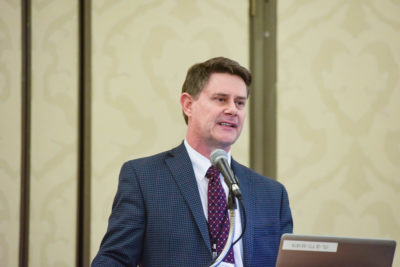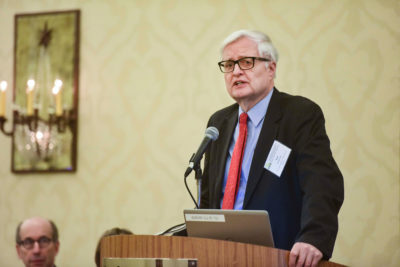
The interests of transportation and public health together occupy a somewhat paradoxical space. Vehicle emissions constitute a public health threat, at the same time that health care and health-promoting activities often depend on access to vehicular mobility.
That reality was one of several themes explored by professionals at the Transportation, Air Quality, and Health Symposium held February 18-20 in Austin, Texas. The gathering was sponsored by the Center for Advancing Research in Transportation Emissions, Energy, and Health (CARTEEH) at the Texas A&M Transportation Institute (TTI).
The symposium wasn’t the first-ever gathering of the two groups, CARTEEH Director Joe Zietsman says, but it was nonetheless noteworthy in other ways. “The highest levels of leadership of both professions were represented here,” said Zietsman, who is also an assistant agency director of TTI. “We’ve had common interests for quite some time, but this level of momentum and traction is something we’ve not seen before.”
The symposium achieved global reach with nearly 150 professionals attending from seven countries. Roughly two-thirds of the attendees were drawn from transportation ranks and the remainder from public health specialties. Zietsman noted that the meeting exceeded expectations, with both registrations and abstract submissions doubling what was anticipated.
During the three-day meeting, attendees were able to focus on a broad array of topics, including transportation planning and health linkages, advancements in research data, freight emissions impacts, agency partnerships, asthma and respiratory ailments, public policy, and others. The symposium also featured a series of poster presentations by students representing nearly a dozen universities.

In the keynote address, Transportation Research Board Executive Director Neil Pedersen characterized the injuries, illnesses and deaths related to transportation as a “public health crisis.” He emphasized the need to address public health goals in transportation decision making, and underscored the importance of additional research to support such decisions. “I applaud CARTEEH and TTI for making this gathering possible and facilitating the collaborative efforts of our respective interests,” Pedersen said.
Dan Greenbaum, president of the Health Effects Institute, highlighted the progress made in pollution reduction over the past 60 years, but noted that air pollution remains the 5th highest risk factor for mortality in the world. He also focused on the need to examine disruptive transportation forms, including transportation network companies and driverless vehicles, in the context of public health. “To address the persistent air quality-related health challenges we face, it’s essential that public health professionals and transportation professionals remain focused in pursuit of our common goals,” Greenbaum said.
Zietsman told attendees that CARTEEH staff planned to build on the success of the first symposium and prepare for the next gathering in 12 to 18 months. He also applauded the work of those responsible for planning the event: Assistant Research Scientist Haneen Khreis, Associate Research Engineer Tara Ramani, and Research Assistant Kristen Sanchez, along with CARTEEH graduate students and TTI staff.